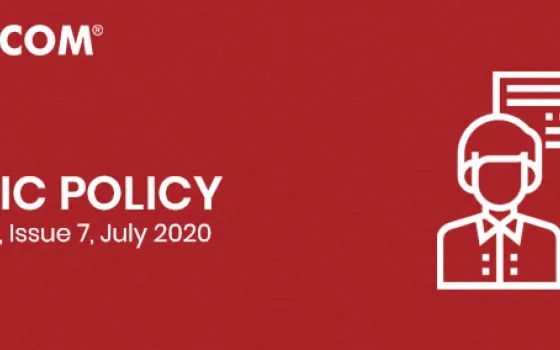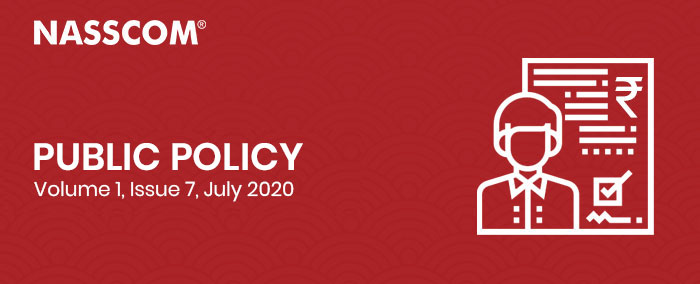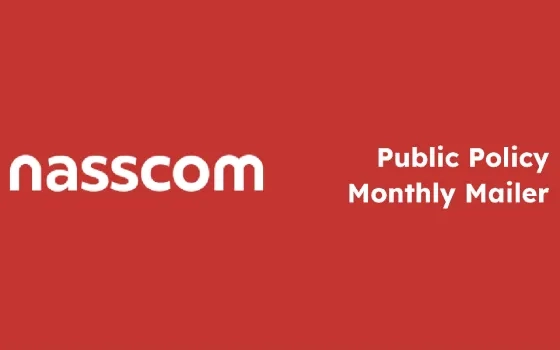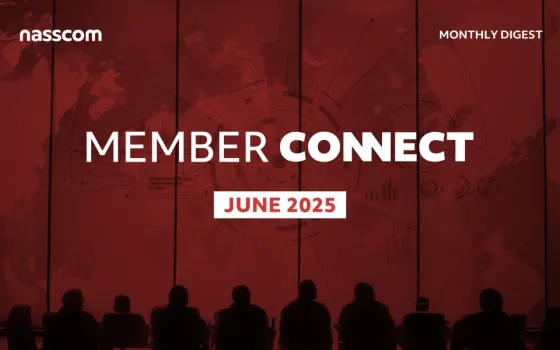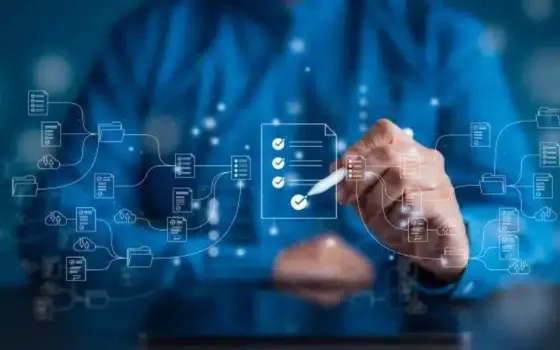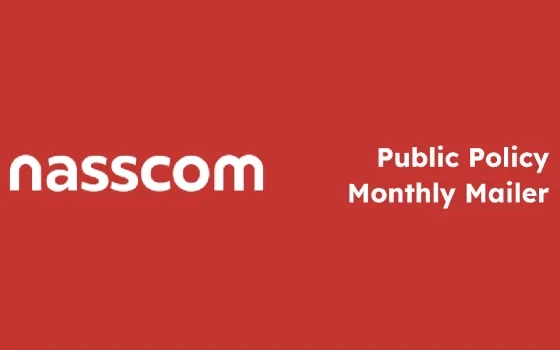| |
| |
| |
 |
|
Industry Meeting with the Union Finance Minister |
|
| |
| |
|
|
 |
|
| |
| |
|
|
NASSCOM organised a meeting on 4 June 2020 with Finance Minister to highlight the industry’s phenomenal effort in enabling a mass transition to Work from Home (WFH), resulting in almost 80-90% employees today working remotely to ensure business continuity. During the meeting, industry participants discussed the focus on tapping opportunities in attracting global IT-ITeS business due to the re-alignment of global supply chains. The discussion, among other things, extended to the industry’s concerns surrounding an extension of income tax holiday under tax laws, issues relating to goods and services tax (GST) (including interpretation of ITeS as Intermediary), labour reforms, and issues faced by start-ups (read more). |
|
| |
|
| |
| |
| |
 |
|
Blended work model: First meeting of the Inter-Ministerial Working Group constituted by MeitY |
|
| |
| |
|
|
 |
|
| |
| |
|
|
Based on NASSCOM’s suggestion, an Inter-Ministerial Working Group (WG) has been set up by the Ministry of Electronics and Information Technology (MeitY) under the Chairmanship of Secretary, MeitY. The WG will look into the requirements of the IT-ITeS sector to enable a long-term blended work model to facilitate WFH permanently. The WG has Joint Secretary level representation from various central Ministries/ departments, including the Department of Telecommunications (DoT), Ministry of Labour & Employment (MoLE), and the Department of Revenue (DoR).
In the first meeting of the WG, held on 10 June 2020, the WG discussed NASSCOM’s suggestions on the subject, and each ministry decided to review them in detail. In addition to discussing recommendations relating to telecom infrastructure and regulations, and relating to special economic zones (SEZ)/ software technology parks of India (STPI), NASSCOM highlighted the need to make appropriate changes in taxation and labour laws or issue relevant clarifications to support remote working models and promote ease of doing business (read more).
|
|
| |
|
| |
| |
| |
 |
|
Ministry of Commerce: Industry requirements relating to WFH operating under SEZ |
|
| |
| |
|
|
 |
|
| |
| |
|
|
On 23 June 2020, NASSCOM made a representation to the Ministry of Commerce (MoC), highlighting industry requirements relating to WFH operating in the SEZs. IT/ITeS companies, including the ones based in SEZs, are looking at a blended working model with both work-from-office and WFH as a permanent feature. While WFH is allowed for SEZ units, in its representation, NASSCOM requested the MoC to clarify some provisions relating to the Income Tax Act, GST Act, and the SEZ Rules and also made recommendations which can help the industry plan their operations from a long term perspective (read more). |
|
| |
|
| |
| |
| |
 |
|
STPI: Industry requirements related to WFH |
|
| |
| |
|
|
 |
|
| |
| |
|
|
NASSCOM made a representation to STPI on 26 June 2020, recommending that the Government should make the provisions related to WFH permanent, to support blended working models. Additionally, NASSCOM represented that for WFH, units should also be allowed to take equipment outside of STPI permanently. The other recommendations made by NASSCOM include allowing units to reduce their operational area and movement of duty-free assets required for WFH on a self-declaration basis (read more). |
|
| |
|
| |
| |
| |
 |
|
GST: Meeting with Principal Commissioner, GST on import of Free of Cost software |
|
| |
| |
|
|
 |
|
| |
| |
|
|
Several recent inquiries have been initiated by GST authorities, particularly the Directorate General of GST Intelligence (DGGI), seeking details of cross-border free of cost (FOC) supplies of software between related parties. Given this, NASSCOM had a meeting with Principal Commissioner, GST, on 4 June 2020. NASSCOM highlighted that access to software provided by overseas affiliates to Indian counterparts is usually for the limited purpose of enabling the provision of services. Such software is not used for any commercial exploitation. Hence, software provided by an overseas affiliate that is used for providing services back to the overseas affiliate should not be considered as an independent supply under the GST law, and should not get covered under entry 4 of Schedule I of CGST Act. As a next step, NASSCOM is making a representation to GST Policy Wing to detail further how the FOC software imported is not used for sale or commercial exploitation (read more). |
|
| |
|
| |
| |
| |
 |
|
GST: Clarity on the implementation date of e-invoicing and issuance of revised schema and updated FAQs |
|
| |
| |
|
|
 |
|
| |
| |
|
|
E-invoicing is a business reform that requires significant changes to Enterprise Resource Planning (ERP) systems, including billing systems and other allied business processes. Given that only three months remain for implementation, absolute clarity is required on the process flow prescribed under the e-invoicing order, for ensuring effective implementation. NASSCOM submitted a representation on 25 June 2020 requesting the Government to release revised FAQs clarifying the doubts/issues faced by taxpayers and revised final schema in synergy with APIs. Further, given the fact that updated FAQs and revised schema are awaited, NASSCOM has also sought clarity on whether the implementation date for e-invoicing continues to be 1 October 2020 (read more). |
|
| |
|
| |
| |
| |
 |
|
GST: Resolution of issues around ‘intermediary services’ for IT-ITeS sector |
|
| |
| |
|
|
 |
|
| |
| |
|
|
The IT-ITeS Industry has been grappling with challenges associated with the current treatment of intermediary services, and the levy of GST on exports. Denying export status to the exporters in the ITeS sector, as well as the alleged tax demands, are hampering the sector’s business viability in India.
NASSCOM has been continuously pursuing this matter with the Ministry of Finance (MoF), the Law Committee, the GST Secretariat and the Central Board of Indirect Taxes and Customs (CBIC), and has made several submissions earlier. However, the industry is awaiting a concrete resolution. Considering the broader impact of the existing uncertainty upon the ITeS industry, NASSCOM met CBIC Chairman and Joint Secretary – Tax Research Unit (TRU) in March 2020 to discuss the issue in detail. NASSCOM had also flagged this issue in its meeting with the Union Finance Minister on 4 June 2020. Subsequently, NASSCOM has been following up with JS-TRU to take a holistic view to resolve the issue.
NASSCOM has submitted a further communication to the GST Policy Wing on 24 June 2020, requesting for resolution of issues around “Intermediary services” (read more).
|
|
| |
|
| |
| |
| |
 |
|
RBI: Clarification on merchant onboarding requirements under the Guidelines on Regulation of Payment Aggregators and Payment Gateways |
|
| |
| |
|
|
 |
|
| |
| |
|
|
NASSCOM made a representation to Reserve Bank of India (RBI) on 24 June 2020, seeking clarity on the merchant onboarding requirements under Sections 7.3 and 7.4 of the Guidelines on Regulation of Payment Aggregators and Payment Gateways, published on 17 March 2020. The representation, among others, highlights the concerns surrounding the apparent prohibition placed upon merchants from storing card data. NASSCOM has requested the RBI to clarify or publish FAQs confirming that PCI-DSS compliant merchants who meet other applicable onboarding requirements in the Guidelines can continue to save customer card and related data (read more). |
|
| |
|
| |
| |
| |
 |
|
Industry Interaction with DoT: Enabling permanent remote working for OSPs |
|
| |
| |
|
|
 |
|
| |
| |
|
|
On 15 June 2020, NASSCOM organised an industry interaction with the Secretary, DoT, to discuss essential industry requirements related to WFH, including the need to extend the current OSP relaxations permanently. Other issues discussed during the interaction included the need to undertake measures to enhance both wireline and wireless connectivity across the country, and the need for clarity surrounding the regulatory treatment of Packet Switched Telecommunications Networks (PSTN) based cloud telephony services. More than 30 industry leaders of the IT-ITeS industry and senior officials from DoT participated in the discussion. Previously, NASSCOM had made a detailed submission to MeitY towards harnessing the potential of WFH (read more). |
|
| |
|
| |
| |
| |
 |
|
MeitY: Suggestions on the draft Handbook on ITT Control and ICP Guide for Export of SCOMET Items |
|
| |
| |
|
|
 |
|
| |
| |
|
|
On 26 June 2020, NASSCOM submitted its feedback on MeitY’s Draft Handbook on Intangible Technology Transfer (ITT) Control and Draft Internal Compliance Program (ICP) Guide. NASSCOM’s comments to MeitY on the ITT Handbook include aligning the definitions used in the Handbook with the Wassenaar Arrangement definitions, the use of consistent terms and well-defined terms, and specifying scenarios wherein visa-vetting measures may be resorted to.
NASSCOM has recommended that the organisational structure and ICP procedure stated in the ICP Guide should not be mandatory given that different companies may already have an existing ICP in place. An effective ICP must focus primarily on end-use and end-user verification along with elements such as product screening and classification, record keeping, awareness and training, and audits (read more).
|
|
| |
|
| |
| |
| |
 |
|
Joint Parliamentary Committee on Personal Data Protection: NASSCOM submits presentation based on its submissions on the Personal Data Protection Bill, 2019 |
|
| |
| |
|
|
 |
|
| |
| |
|
|
As a part of the consultation process undertaken by the Joint Parliamentary Committee (JPC) chaired by Member of Parliament, Smt. Meenakshi Lekhi, NASSCOM, together with the Data Security Council of India (DSCI) submitted their comments on the Personal Data Protection Bill, 2019 (PDP Bill) on 26 February 2020. The NASSCOM-DSCI submission was prepared based on extensive industry consultation carried out between December 2019 and January 2020. More recently, NASSCOM was invited by the JPC to submit a presentation on its views on the PDP Bill. Accordingly, NASSCOM and DSCI submitted a presentation deck before the JPC on 8 July 2020, highlighting the key points from its February 2020 Submission (read more). |
|
| |
|
| |
|
|
|
| |
| |
| |
 |
|
NASSCOM to submit feedback on Draft Unmanned Aircraft System Rules, 2020 |
|
| |
| |
|
|
 |
|
| |
| |
|
|
The Directorate General of Civil Aviation (DGCA) released the draft Unmanned Aircraft System Rules, 2020 (UAS Rules), on 2 June 2020. Public consultation on the UAS Rules is open till 3 July 2020. The UAS Rules allow unmanned aircraft to operate, which will be a significant change from the existing Requirements for Operation of Civil RPAS (initially contemplated in the draft Drone Policy 2.0). However, other recommendations of the draft Drone Policy 2.0, such as beyond visual line of sight operations and carriage of a payload are not envisaged in the UAS Rules.
NASSCOM is analysing the UAS Rules in detail and will submit its written representations to the DGCA based on industry feedback. For more information, contact dagarwal@nasscom.in and komal@nasscom.in (read more) . |
|
| |
|
| |
| |
| |
 |
|
NASSCOM feedback to Department of Commerce on the WTO Customs Moratorium on Electronic Transmissions |
|
| |
| |
|
|
 |
|
| |
| |
|
|
Initially adopted as a temporary customs moratorium on electronic transmissions, the moratorium has continued since the adoption of the World Trade Organization (WTO)‘s Declaration on Electronic Commerce in 1998, being rolled over every two years (except for 2003 to 2005, owing to a lack of consensus at the Cancun Ministerial Conference). NASSCOM had released an Industry Consultation Paper on the subject in January 2020 and provided its preliminary feedback to the Department of Commerce on 28 February 2020. With the 12th Ministerial Conference of the WTO, originally scheduled to be held between 8-12 June 2020, being postponed indefinitely at the moment, NASSCOM plans to consult the industry and finalise the submission to the Government. For more information, contact indrajeet@nasscom.in (read more). |
|
| |
|
| |
| |
| |
 |
|
Three Years of GST: Interactive session with key government officials |
|
| |
| |
|
|
 |
|
| |
| |
|
|
The GST regime has completed three years of its implementation. GST, introduced in 2017 as the most significant reform to India’s indirect taxation system, has been showcased as the foundation for the One Nation One Tax framework. As we step into the fourth year of GST, the industry, the Government, and all other stakeholders need to take stock of the significant developments and milestones achieved in the implementation of the GST regime and chart out the way forward. In this regard, NASSCOM is planning to organise an e-meeting with key Government officials in attendance, to discuss some of the significant developments that are impacting the IT-ITeS sector, and other unresolved issues. The session is tentatively scheduled to be held in the third week of July. For more information, contact tejasvi@nasscom.in. |
|
| |
|
| |
| |
| |
 |
|
Discussion Paper on Equalisation Levy introduced vide Finance Act, 2020 |
|
| |
| |
|
|
 |
|
| |
| |
|
|
Taxing companies that do business digitally without any physical presence in a jurisdiction is a crucial issue for tax authorities around the world. To cater to the problem, India recently introduced Equalisation Levy (EL) on non-resident e-commerce operators, which currently has an extensive scope. Given the immense and growing potential of digital activities, NASSCOM will be releasing a Discussion Paper to examine the questions raised concerning this levy, discuss the impact of the tax, and possible means to address the industry’s concerns. For more information, contact tejasvi@nasscom.in and jayakumar@nasscom.in. |
|
| |
|
| |
| |
| |
 |
|
NASSCOM Discussion Paper: Amendments to the Information Technology Act, 2000 |
|
| |
| |
|
|
 |
|
| |
| |
|
|
In light of MeitY’s ongoing review of the IT Act to address the regulatory challenges posed by emerging technologies, NASSCOM will be releasing a discussion paper on amendments to the Information Technology Act, 2000 (IT Act). For more information, contact komal@nasscom.in and dagarwal@nasscom.in. |
|
| |
|
| |
|
|
|



